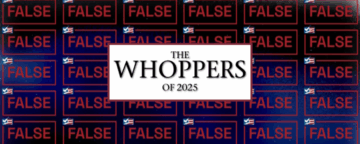During the outbreak of “mad cow” disease in the 1990s, British leaders assured the public that beef was safe to eat. It wasn’t. By 2012, the human variant of bovine spongiform encephalopathy, or BSE, had killed 176 Britons. In their unjustified and unqualified assurances, the British officials misled the public and eroded faith in science.
“When custodians of knowledge make claims that are proven false, subsequent assurances of safety in other domains are contaminated,” writes Kathleen Hall Jamieson, director of the Annenberg Public Policy Center, in “The role of language in expressing the life sciences in a polarized age,” an article published in the spring 2017 issue of the journal Politics and the Life Sciences.

Jamieson, a scholar of rhetoric, writes that “custodians of knowledge” — institutions such as the Centers for Disease Control and Prevention, and the Food and Drug Administration — “tell us what science knows and how it knows it.” Their use of language can clarify or cloud the public’s understanding of science, and so we need to be aware of how audiences hear the language used to describe scientific concepts. When “linguistic choices miscommunicate the underlying science, the policy debate becomes muddied and the credibility of science is more susceptible to polarizing challenge,” she says.
In a series of examples she discusses the role of custodians of knowledge, how inconsistent use of language can invite doubt, and how linguistic choices can have a lasting impact on how the public understands scientific evidence.
In Britain, for instance, memories of false assurances during the “mad cow” outbreak helped to mobilize subsequent opposition to genetically modified organisms (GMOs).
Jamieson also considers cases when spokespersons for major science organizations sowed doubt about scientific consensus on controversial issues by using imprecise language. Former U.S. secretary of agriculture Dan Glickman did so with extemporaneous remarks about the safety of GMOs during an interview in 2013. Although Glickman said there was no scientific reason to label genetically modified crops, he cast doubt about the precision of the government’s testing equipment, thereby undercutting his own initial conclusion.
“The role of language in expressing the life sciences in a polarized age” is based on a keynote plenary lecture Jamieson delivered at the annual conference of the Association for Politics and the Life Sciences (APLS) on Oct. 23, 2015 at the University of Wisconsin-Madison.



